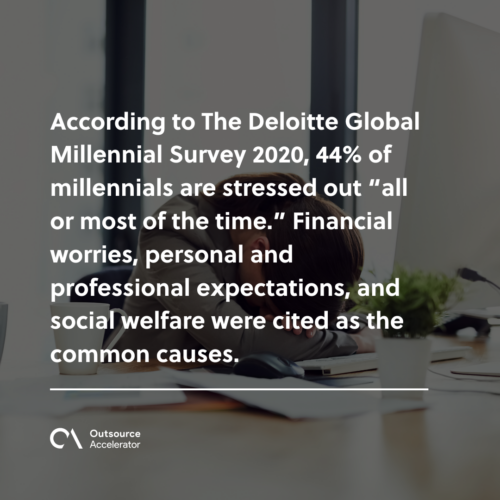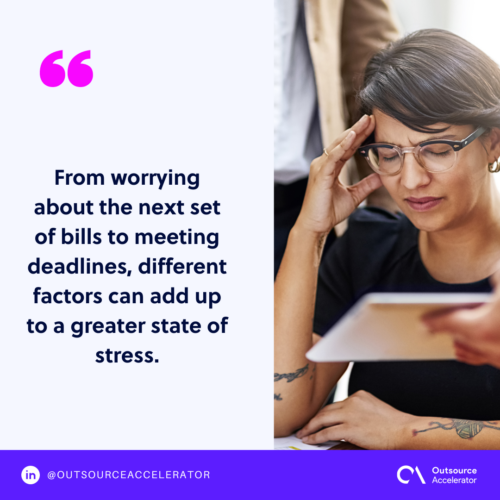Who is the burnout generation?

If running simple errands feel like a heavy burden, you may be experiencing burnout.
Many professionals experience burnout during their careers. Contrary to popular belief, it’s not exclusive to people who have physically and emotionally demanding jobs.
Everyone is at risk of experiencing severe stress and exhaustion, but millennials are at a greater risk.
Why are millennials dubbed as the burnout generation
Silently dubbed as the burnout generation, millennials (born between the 1980s and 1997) are subject to a higher risk of work- and school-related stress.
According to The Deloitte Global Millennial Survey 2020, 44% of millennials are stressed out “all or most of the time.” Financial worries, personal and professional expectations, and social welfare were cited as the common causes.
On the other hand, stress levels aren’t exclusive to one part of society or select age groups only. Burnout could be well on its way to the next generation of victims, and millennials aren’t the only ones susceptible.
While there are external factors that we need to consider, Generation Z is already next in line. The oldest bunch of this generation are already entering young adulthood, while the younger ones are still experiencing school and its environment.

Defining burnout and its causes
Before diving deeper into the big question of why millennials are part of the burnout generation, we should discuss what burnout is first.
Burnout is a condition in which a person feels stressed, anxious, agitated, and exhausted for long periods of time. Early signs of stress and exhaustion can be manifested in the following ways:
- Getting little to no sleep
- Trouble focusing on tasks
- Being forgetful
- Mood swings
- Frustration at work or school
- Demotivation
These signs can show along with other ailments and illnesses, so it’s best to catch them early on. Below are the common causes of burnout:
Lack of control
The burnout generation often experiences a lack of control over their lives, whether professional or personal.
They often find themselves questioning their decisions and motives: Why did I choose this job? Why did I take up this degree? How did I end up here?
With these questions unanswered, the burnout generation starts to spiral down to an anxious state.
Prolonged stress
From worrying about the next set of bills to meeting deadlines, different factors can add up to a greater state of stress.
These stressors cause the body to constantly be in a fight-or-flight state, which the body is not used to. This phenomenon can cause anxiety disorders and emotional outbursts.
Lack of a support system
This can hit remote workers especially hard. Without a physical work environment with colleagues, they can fall into stress caused by a lack of social support.
Support systems in the workplace are an important part of any healthy organization.
Unclear projections
Unclear projections or life direction can lead individuals into an existential crisis. Anxiety-inducing questions often go unanswered, thus leading to a state of prolonged stress.
Finding answers to these questions will often be hard and fruitless, driving the individual to the point of total exhaustion.

6 helpful work tips from the burnout generation
While it is strictly not a medical condition, burnout can’t be treated the same way one recuperates from a stressful week. Ways to combat burnout are not limited to these tips, but they are some of the best ways to prevent stress from escalating.
- Reinstate work-life balance.
- Take time for yourself.
- Leave work in the workplace.
- Practice saying no.
- Know your limitations and work efficiently.
- Leave a toxic workplace for a healthy work culture.
If your situation is giving you signs to stop, make sure to listen to it. Listen to your body and how it responds to external stimuli. Cut off what makes you feel exhausted and take it as an opportunity to reinvent yourself.
Most importantly, it is okay to ask for help. If a support system is not available in the workplace, you can turn to your family or friends. Family and social interaction can help ease any negative feeling.







 Independent
Independent




